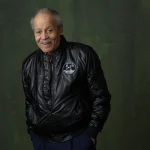I grew up in a small village in Barbados, where life was simple but happy. Our wooden house had two rooms, no running water, and no kitchen. My siblings and I went to school barefoot because we couldn’t afford shoes, and my earliest memory of my mother is of her crying because she couldn’t buy me and my brother an ice cream. But despite our hardships, we were never hungry, and we spent our days outside, playing cricket until the sun went down.
Cricket was everything to me. We didn’t have proper equipment, so we made do with what we had. We carved bats out of coconut tree branches, and my mother’s decorative plastic fruits became our balls. Listening to matches on my father’s transistor radio opened my world beyond our tiny island. I wondered about the places I heard about—India, Australia, England. What did their grass feel like? Did they have coconut trees?
That curiosity stayed with me as I grew older. I worked hard in school, earning a place at the prestigious Combermere School. It was a big deal for our family. My mother saved to buy me a bicycle, and I used it to explore. One day, I cycled down to the harbor and saw aircraft landing on an American ship. Watching those planes sparked something in me. When I told my father I wanted to fly airplanes, his response was, “Black people don’t fly airplanes. You should think about being a doctor, lawyer, or engineer.” That moment changed me. I thought, I’ll show you.
Cricket continued to play a huge role in my life. By 14, I was bowling against some of the best players in the world. When a visiting English school offered me a scholarship, I was thrilled. Leaving Barbados for England wasn’t hard for me, but it was for my mother. My father was over the moon, though. For him, it was a dream—his son going to England to study and play cricket.
Malvern College was a culture shock. I’d grown up in a village with one black-and-white television shared by the whole community. Suddenly, I was surrounded by luxury I couldn’t fathom, like remote controls and toasters. Being the only Black student at the school was challenging, but it also taught me valuable lessons about race and resilience. Cricket became my outlet, and my fast bowling earned me a spot in Worcestershire’s first team by the time I was 17.
But the dream didn’t last. The physical strain of fast bowling took a toll on my body. Stress fractures, surgeries, and relentless pain forced me to retire at just 25. Losing cricket felt like losing myself. I spiraled into depression, but eventually, I found clarity during a backpacking trip across America. That trip rekindled my childhood dream of flying.
Becoming a pilot wasn’t easy. It took three years of training, significant financial sacrifice, and unrelenting determination. I faced racism, too. Once, a company scheduled an interview, only for the receptionist to tell me the chief pilot wasn’t available when she saw me. But I persisted. Eventually, Virgin Atlantic gave me a chance, and in 1998, I became their first Black captain.
I’ll never forget my first flight as a captain into Barbados. Sitting at the end of the runway, I thought, You’ve done two dream jobs in your life. How lucky can you be? I wished my father had been alive to see me land that 747.
But life had another curveball for me. In 2014, mid-flight over the Atlantic, I lost coordination on the right side of my body. The diagnosis was grim: a brain bleed that kills 90% of people. Over the next few years, I underwent four surgeries to remove a dangerous membrane pressing on my brain. The recovery was brutal, and my flying career was grounded indefinitely. Yet, I consider myself lucky. I’m still here.
Losing cricket prepared me for losing flying. My life has been a roller coaster, but I’ve learned resilience through it all. I’ve lived two dreams that most people only imagine, and even though I’ve lost them, I’m grateful for the journey. Today, at 59, I wake up feeling blessed to be alive. And when I dream, I still hear the roar of a crowd at a cricket match or the hum of a 747 engine. Those dreams remind me of a life well-lived.












